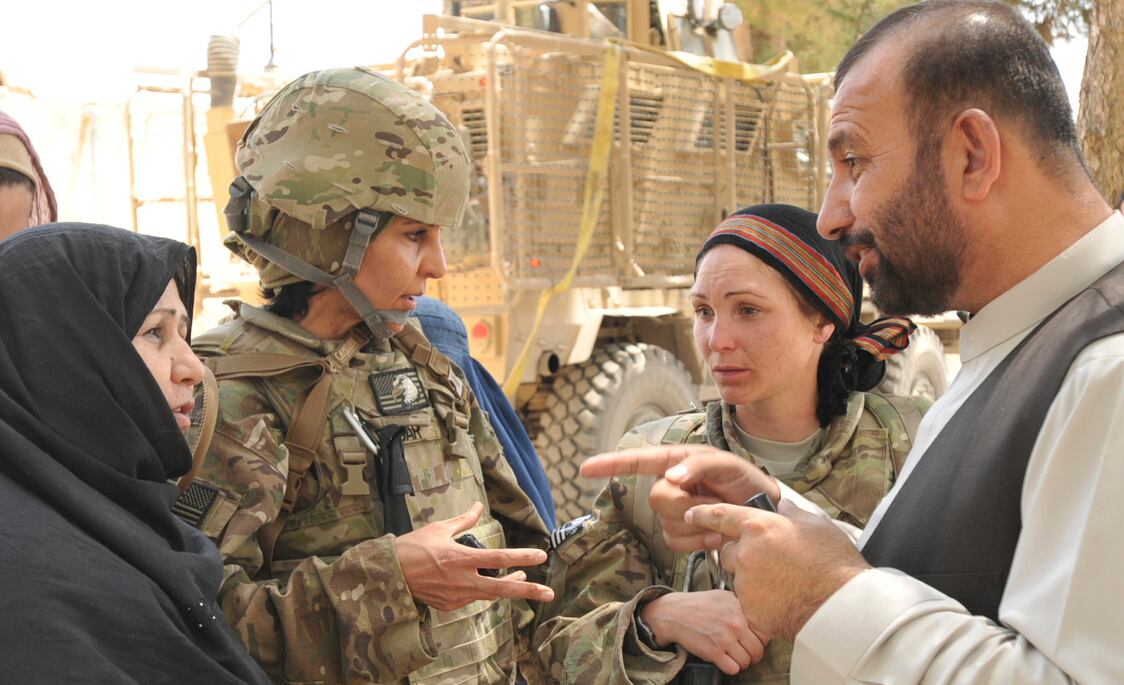The following is an opinion piece and does not necessarily reflect the views of Marine Corps Times or its staff.
In her memoir “Unbecoming,” Marine veteran Anuradha Bhagwati owns everything that happened to her and she’s willing to share it, unsparingly dissecting her service in the Marine Corps — and how she recovered from it.
At its heart, “Unbecoming” is a coming of age story about how one young woman found her voice.
No one who has served in the Corps or alongside Marines would be surprised to find that it’s often a wry, witty, honest and profane voice.
Take her definition of a gunnery sergeant: a senior enlisted person with about fifteen years of service who’s “known to have the fewest fucks to give about anything.”
But it’s also a powerful and angry voice, which is perfectly pitched for speaking about the way the Corps repeatedly betrays its female Marines.
She uses it to sound off about "some of the nation’s most precious myths about men in uniform” and the "truths about sexual harassment and sexual assault, and the daily humiliations women had to suffer through in order to wear the uniform.”

Long before she earned the Eagle, Globe and Anchor, Bhagwati was a daughter born to a pair of brilliant economics professors who emigrated to the United States from India.
Her father in “Unbecoming” rarely seems satisfied with her accomplishments: athletic prowess on the basketball court, entrance into Manhattan’s academically prestigious Stuyvesant High School and a degree from Yale before shipping off to Quantico’s Officer Candidate School.
Anyone who has experienced military indoctrination will nod knowingly at her descriptions of the physical and mental suffering at OCS — and her awed descriptions of a revered drill instructor, Staff Sgt. Brenda Baughman, who pushed women to meet standards set for male Marines.
“DIs had a way of imprinting themselves upon a human being’s deepest layers of consciousness — infiltrating dreams, altering language learned at birth, reprogramming basic bodily functions and priorities, desires and fears,” she wrote.
But Bhagwati learns other lessons in OCS that unfortunately sound all too familiar to many women in uniform.
She’s distressed to discover that despite Baughman’s efforts, female Marines still train to a lower standard than men. And they’re expected to fail.
During OCS, she volunteers to deliver a message, leaving her rifle in the custody of others while she’s gone. When she returns, it had disappeared.
That teaches her to never trust the women in her platoon again. She begins to realize that very few women even value the welfare of the team over themselves.
At the same time, she also learns to avoid female candidates who struggle through training, lest their failures become contagious.
After her commissioning, she arrives at The Basic School and learns a few more lessons about the Corps.
She remembers an inebriated male lieutenant who climbs into her roommate’s bed. Bhagwati listens while she declines help, persuading the man to not rape her “as if she were negotiating a hostage release,” before escorting him back to his own room.
When both the men and women in the platoon close ranks to protect the man from sexual assault accusations, she learns that servicewomen face two choices: play along by acting like nothing is wrong, or suffer privately and keep quiet.
When she complains about an instructor who told the class the “if you can’t fight it, just relax and enjoy it” rape joke, a captain hearing her out advises Bhagwati to pick her battles against military culture — and this one wasn’t it.

By the time Bhagwati arrives at her first duty station on Okinawa, she has "a lot to prove, and a lot of rage to work off.”
She burns some it away by mastering the Marine Corps Martial Arts Program, which mixes Eastern and Western hand-to-hand combat techniques.
Although suffering a detached kneecap, she powers through the grueling course, becoming the second woman to graduate the program— despite discouragement and public humiliation at the hands of then-Lt. Col. George Bristol, the man who created the course in its current form.
MCMAP taught her not only how to take hits and fall but also to never pull any punches, lessons that prepared her well for life in the Fleet.
There was that fellow lieutenant, drunk, who punched her in the face, unprovoked, during a casual conversation on the street.
Or that time two other officers invited her to view their bestiality porn.
And the married Marines on liberty who hired Pattiya Beach prostitutes during an exercise in Thailand.
She’s no less candid about her own bisexuality and a Thai woman she met in a bar there.
“I paid for a hotel room, and minutes later we were in bed, our bodies locked together," she wrote.
That encounter could’ve been considered a crime during the Don’t Ask, Don’t Tell era.
“I had given up on the Marine Corps long before this,” she wrote. “If everyone else was above the law, then why shouldn’t I be? I wasn’t married. I didn’t have kids back home, crying themselves to sleep at night. I didn’t have some home bound wife I knocked up straight out of high school, the victim of my pathologically seductive dress blues, oblivious to the Corps’ day-to-day realities about monogamy, misogyny, and marriage.”
When her commanding officer later chastises her for “homosexual conduct” in Pattiya Beach, she threatens to out every married Marine who committed adultery, which also was a potential violation of the Uniform Code of Military Justice.
“I had no skin to protect myself from people’s language, and no moral reference that counted for shit anymore," she wrote. "Men’s words about women, the filth that was said to keep us from realizing our potential, became the core of what I believed about myself.”
RELATED

She ends her service to the Corps as an instructor assigned to the School of Infantry. There, she greets rampant sexism and misogyny, some of it covered up with a hefty dollop of hypocrisy.
There’s the infantry colonel helming the school, a man with a daughter in college interested in becoming a Marine Corps officer.
But when a staff sergeant is accused of sexually assaulting female students during field exercises, the colonel transfers him to Iraq instead of charging him with misconduct.
Then there was the time a female sergeant reported that one of Bhagwati’s new lieutenants not only sexually harassed her but started rumors to ruin her reputation.
Bhagwati brings all that to her battalion commander and his executive officer.
The CO suggests the non-commissioned officer is lying to ruin the lieutenant’s career. The XO refuses to relieve the officer and orders Bhagwati to never speak about the accusations outside the chain of command.
To protect junior enlisted women from the lieutenant, Bhagwati’s first sergeant shadows him. And despite the allegations and an investigation dogging the lieutenant, the school’s colonel promotes him to captain and assigns him to relieve Bhagwati as company commander when she departs.
Every woman the lieutenant harassed left the Corps, too, Bhagwati writes.
Now a civilian, Bhagwati pursues a master’s degree program in public policy at Harvard. She’s diagnosed with depression, anxiety, and Post-Traumatic Stress Disorder and then, in 2009, founds SWAN — the Service Women’s Action Network, an advocacy group in Washington, D.C. that fights for military reform.
Her memoir takes swings at those she believes exploit the victims of military sexual assault — journalists and filmmakers, veterans service organizations and elected officials. She reserves her harshest criticism for those she accuses of betraying female victims they claim to represent while advancing their own agendas.
Her words are more restrained while describing how enthusiastic but inexperienced advocates burn out while trying to change how society talks about sexual assault in the military.
Every person interested in how the military should recruit, train and retain women must read “Unbecoming.” And every leader in the armed forces should pick up a copy to better understand how misogyny, sexual harassment and sexual assault hurt the all-volunteer force.
Men and women who have fallen victim to these scourges will find echoes of their own stories in Bhagwati’s well-written and thoughtful memoir.
And for those who still suffer from the trauma, Bhagwati’s literary journey to forgiveness and healing also might plant signposts that lead you to peace, too.
Jerri Bell is the Managing Editor of O-Dark-Thirty, the literary journal of the Veterans Writing Project. She retired from the Navy in 2008.





